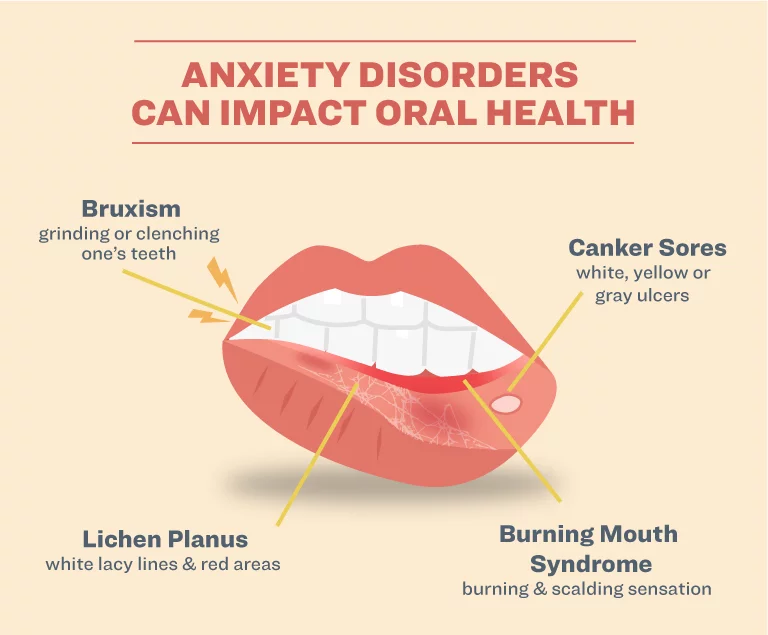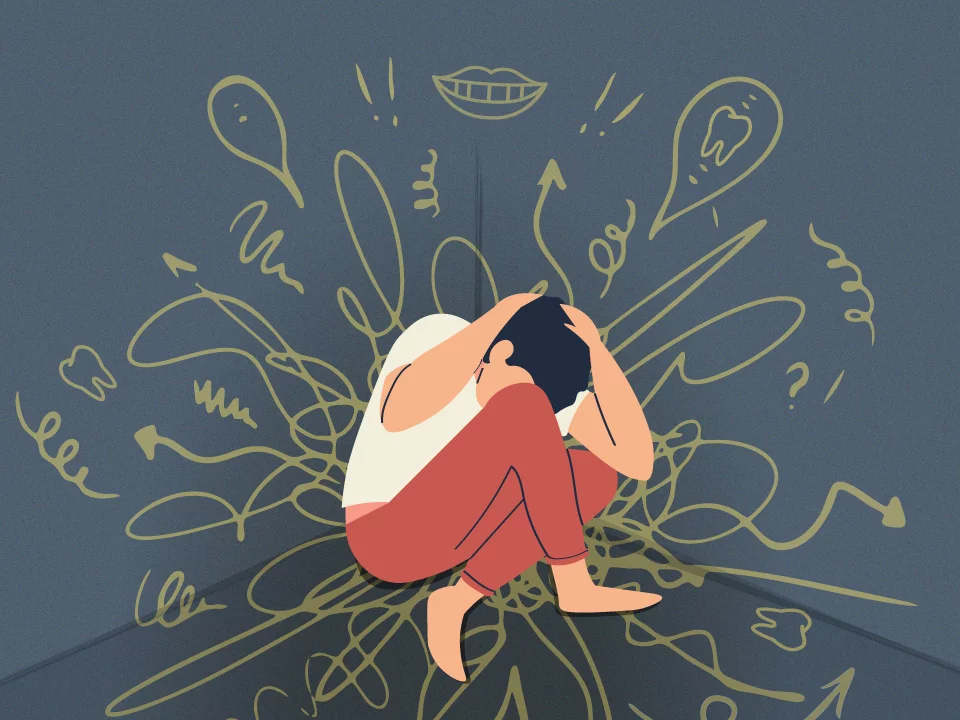Blog Summary Anxiety can harm oral health, causing dry mouth, canker sores, teeth grinding, gum issues, and burning mouth syndrome. Persistent pain or sores require dental care. Sharing anxiety and medications with your dentist enables tailored support, highlighting the close connection between mental health and oral health.
The mouth usually isn’t an obvious place to look for the impact of an anxiety disorder. Yet, the inside of the mouth is where anxiety does manifest, from chipped and fractured teeth to frequent canker sores. These conditions are examples of the correlation between anxiety and the health of the mouth, a link that isn’t as widely known as it should be.
National health surveys estimate that more than 31 percent of teens and adults experience an anxiety disorder at some time in their lives [1], including generalized anxiety disorder (persistent or excessive worry), phobias, social anxiety disorder, separation anxiety disorder, panic disorder, agoraphobia (fear of being in situations where help or escape is perceived as difficult), and selective mutism (inability to speak in some social situations.[2]
Here are ways in which their anxiety disorder can impact their mouth:
The Connection: How Stress and Anxiety Impact Oral Health
When you experience stress or anxiety, your body activates the "fight-or-flight" response, releasing hormones like adrenaline and cortisol. This prepares you to react but also diverts blood from non-essential functions such as saliva production, leading to a dry mouth. If stress is ongoing, these effects persist and can weaken your mouth’s immune defenses, making it harder to fight bacteria or heal. This link between stress, hormonal changes, and immune shifts explains why anxiety can cause issues like dry mouth, mouth ulcers, or sensitivity.
Common Oral Manifestations of Stress and Anxiety
Stress and anxiety can cause various mouth symptoms, such as dry mouth (xerostomia), making chewing and swallowing difficult and increasing the risk of cavities and bad breath. Stress can also trigger canker sores—small, painful ulcers inside the mouth. Unlike cold sores, canker sores are not contagious. Anxiety often leads to teeth grinding or jaw clenching (bruxism), resulting in jaw pain, tooth wear, headaches, or sensitivity. Other symptoms include sore or inflamed gums and a burning or tingling tongue (“anxiety tongue”). These issues can worsen with ongoing stress, so it is important to watch for changes in oral health as potential signs of elevated anxiety.

Canker Sores
These are white, yellow or gray ulcers that appear temporarily on the inside of the lips, below the gums, on the roof and walls of the mouth. They can be uncomfortable and can last from a week to several weeks. Stress and anxiety can trigger the appearance of canker sores, but researchers have yet to determine how or why that happens.[4]
Moreover, these ulcers often recur in individuals undergoing periods of emotional distress, thus highlighting a strong correlation between psychological health and oral health. Consequently, canker sores may become more frequent or severe during stressful times, which can further interfere with eating, speaking, and maintaining oral hygiene. While the discomfort typically fades with time, ongoing or unusually persistent ulcers should prompt consultation with a dental professional for proper evaluation and symptom management.
Lichen Planus
This a chronic inflammatory condition that features white lacy lines and red areas on the gums, tongue and inside the cheek. Experts theorize t hat it appears due to a combination of factors, including genetic predisposition and anxiety. [5]
Furthermore, lichen planus can cause discomfort and make eating or speaking more challenging, thus impacting daily activities. Although the exact cause remains unclear, psychological stress is believed to play a significant role in triggering flare-ups or worsening existing symptoms. Consequently, managing stress and anxiety effectively may help reduce the severity or frequency of oral lichen planus episodes.
Burning Mouth Syndrome
This is an ongoing or recurring burning and scalding sensation on the gums, tongue, inside the cheeks, or roof of the mouth. It is linked to anxiety and can develop over time or occur suddenly, but not enough is known about it. [6,7]
Researchers suggest that psychological factors such as chronic stress, anxiety, or depression may contribute to the onset or persistence of burning mouth syndrome. Furthermore, hormonal changes, nutritional deficiencies, and damage to oral nerves are also thought to play a role. Consequently, people experiencing these symptoms may notice a metallic or bitter taste, tingling, or numbness in addition to the burning sensation. Because burning mouth syndrome can significantly impact daily life by affecting speech, eating, and overall comfort, it is important for individuals to discuss persistent oral discomfort with a healthcare professional for proper diagnosis and management.
Bruxism
Grinding or clenching one’s teeth, known as bruxism, often occurs unconsciously during sleep or times of heightened stress. This doesn't cause serious complications for most people, but in severe cases, it can damage teeth, fillings, and crowns. Bruxism may also contribute to jaw pain, headaches, and increased tooth sensitivity over time. Its cause is unknown and a combination of physical, mental health, and genetic factors may play a role.[3]
Furthermore, anxiety can lead to habits that negatively affect oral hygiene. Sometimes, people with anxiety might not feel like brushing their teeth and flossing regularly, and that can increase the risk of gum disease and caries. Consequently, ongoing bruxism combined with lapses in dental care could accelerate the progression of oral health issues, making prevention and early intervention essential.
When to Seek Professional Guidance
While occasional stress-related oral symptoms can be managed at home, certain signs require professional evaluation. See a dentist if mouth sores, ulcers, or dry mouth last over two weeks, or if you experience severe pain, excessive bleeding, or difficulty eating, drinking, or speaking. Unusual swelling, pus, or a foul odor may indicate an infection or gum disease that needs prompt treatment. Any persistent symptoms interfering with daily life should not be ignored, as early intervention protects your oral and overall health.
It’s a good idea for those with an anxiety disorder to enlist the help of their dentist as early as possible by letting their dentist know about their mental health condition, including any medications they are taking to treat the condition’s symptoms. This enables the oral healthcare team to address the impact during dental visits and even work in tandem with mental healthcare providers on a holistic approach to the wellness of the mouth and mind.
Find your trusted, local dentist today!
Sources
[1] National Institute of Mental Health. (n.d.). Statistics on anxiety disorder. U.S. Department of Health and Human Services. https://www.nimh.nih.gov
[2] Veronese, N., Demurtas, J., Celotto, S., Caccaro, M., Schofield, P., Anghinoni, T., ... & Stubbs, B. (2016). The oral health of people with anxiety and depressive disorders – A systematic review and meta-analysis. Journal of Affective Disorders, 210, 56–67. https://doi.org/10.1016/j.jad.2016.05.121
[3] Mayo Clinic. (n.d.). Teeth grinding (bruxism). https://www.mayoclinic.org
[4] Cleveland Clinic. (n.d.). Canker sores. https://my.clevelandclinic.org
[5] Khozema, D. S., & Vaidya, N. (2022). A case series of psychological stress evaluation as a risk factor for oral lichen planus. Case Reports in Dentistry, 2022, Article ID 9459616. https://doi.org/10.1155/2022/9459616
[6] Mayo Clinic. (n.d.). Burning mouth syndrome. https://www.mayoclinic.org
[7] Lin, M., Wang, X., Zhang, L., & Chen, Y. (2025). Analysis of pain prognosis, medication efficacy, treatment willingness and influencing factors in patients with burning mouth syndrome: A cross-sectional survey. BMC Oral Health, 25, Article 72. https://doi.org/10.1186/s12903-025-03245-6
Smile Generation blog articles are reviewed by a licensed dental professional before publishing. However, we present this information for educational purposes only with the intent to promote readers’ understanding of oral health and oral healthcare treatment options and technology. We do not intend for our blog content to substitute for professional dental care and clinical advice, diagnosis, or treatment planning provided by a licensed dental professional. Smile Generation always recommends seeking the advice of a dentist, physician, or other licensed healthcare professional for a dental or medical condition or treatment.





